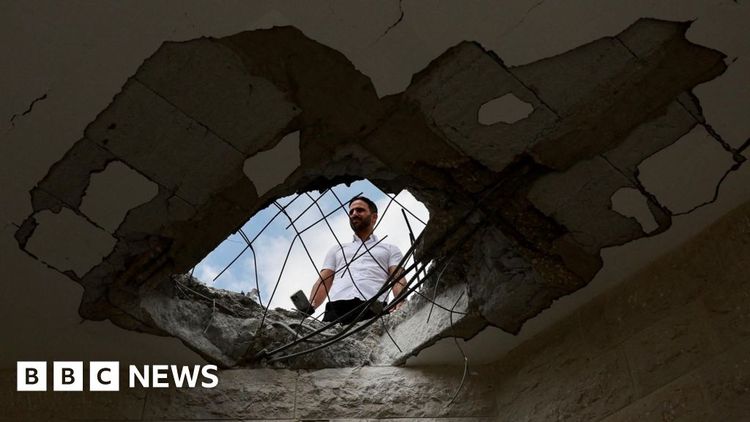UN calls for calm after Israel and Hezbollah trade strikes

The Israeli army reported that the attack by Hezbollah caused minimal harm.
UN Secretary General António Guterres expressed strong worry after Israel and the Hezbollah group in Lebanon carried out their most significant exchange of attacks across the border since the conflict in Gaza started.
Over the weekend, Israeli warplanes targeted many locations in southern Lebanon to stop a potential larger attack, while Hezbollah fired multiple rockets and drones towards Israel.
Mr. Guterres cautioned that their behaviors are endangering innocent civilians and also posing a threat to the security and stability of the region.
The United States stated that they were taking steps to prevent any further increase in conflicts, and both parties indicated that they were not seeking any escalation.
Since October 7th, there have been frequent instances of gunfire along the border between Israel and Lebanon following the beginning of the conflict between Israel and Hamas in Gaza.
Hezbollah has stated that they are supporting the Palestinian group. Both organizations are supported by Iran and are considered terrorist groups by Israel, the UK, and other nations.
In the past few months, over 560 individuals have lost their lives in Lebanon, with most of them being Hezbollah members. Meanwhile, authorities have reported that 26 civilians and 24 soldiers have been killed in Israel during the same period.
Nearly 200,000 individuals have been forced to leave their homes on either side of the border.
Early on Sunday morning, Israel launched an airstrike on Hezbollah, targeting numerous rocket launchers at over 40 locations in southern Lebanon. Approximately 100 jets were involved in the operation.
The military said they launched the strikes after discovering thorough planning for a large-scale aerial attack by Hezbollah.
Hezbollah reported that two of its members were killed in the attacks, along with a fighter from the Amal movement who is an ally.
Hezbollah claimed to have attacked and successfully hit 11 military bases in Israel and the occupied Golan Heights using 340 rockets and a significant amount of drones.
It talked about the attack as a reaction to the killing of high-ranking military leader Fuad Shukr, who was fatally shot in a strike by Israel in Beirut on July 30th.
The Israeli army reported that they prevented "a majority of the attacks" launched by Hezbollah and that the missiles that reached their target caused only "minor damage".
Additionally, reports indicate that a member of the navy was fatally injured during a conflict in northern Israel. It was reported that the soldier was aboard a patrol vessel when an intercepting missile targeted a drone.
This past Sunday night, Hezbollah leader Hassan Nasrallah spoke on TV to his followers in what seemed like an effort to calm down the situation.
He announced that the group's initial retaliation for Shukr's murder was carried out according to the plan, but they are still evaluating its effects.
"If the outcome is not satisfactory, we will retain the discretion to answer at a later date," he stated.
Meanwhile, he also mentioned that the citizens of Lebanon can relax and continue with their daily routines, as the country has been under stress for the past month.
Video shows rockets stopped over Israel
Before, the leader of Israel, Benjamin Netanyahu, said to his cabinet that "what occurred today is not the final chapter."
"We are dealing severe blows to Hezbollah that they did not expect," he said. "Just three weeks ago, we took out their leader and today we stopped their planned attack."
Nasrallah in Beirut and the Supreme Leader of Iran, Ayatollah Ali Khamenei in Tehran, must understand that this is another move towards improving the situation in the north and safely bringing our citizens back to their houses.
The spokesperson reported that the UN secretary general has urged for a quick reduction in tensions and for both parties to promptly return to a halt in hostilities.
Jake Sullivan, the National Security Adviser at the White House, expressed optimism that the events on Sunday would not escalate into a full-scale regional conflict.
"We have been working tirelessly with our partners and allies, mobilizing military resources, and conducting extensive diplomatic efforts, both publicly and discreetly, to prevent that situation," he informed journalists while visiting Halifax, Canada.
According to diplomats who spoke with Reuters, both parties have communicated that they do not wish to escalate the situation any further.
Mr. Sullivan also mentioned that American officials have been working very hard in recent days during negotiations in Cairo to reach a new agreement for a ceasefire and the release of hostages in Gaza. The White House views this as crucial in order to bring peace to the Israel-Lebanon border.
Despite efforts, there has been no progress made yet. Hamas released a statement on Sunday stating that their representatives had returned from Egypt to assess the results of the talks, which they chose not to participate in.
Security sources from Egypt informed the Reuters news agency that both Hamas and Israel did not accept various proposals put forward by mediators from the US, Qatar, and Egypt.







































